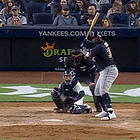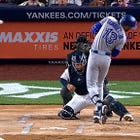How to Fix the Home Run Derby
One simple change to make the Derby as exciting as it should be
Do you know how the Home Run Derby works?
It’s a genuine question. Next week’s skills competition has been newly redesigned for 2024, so this year’s eight contestants will be the first to compete under the new rules. Though when it comes to the Home Run Derby, such changes are the norm. By my count, this year’s event will mark the ninth different set of rules over the last 11 Derbies. Only twice since 2013 has MLB has hosted a home run contest with no format changes from the previous year.
Such constant tweaking is not a sign of an event that people really like.
The Derby should be one of the most-compelling nights in all of sports. It is the only event on MLB’s calendar in which athletes directly compete against each other as individuals. In a staid sport that encourages athletes to shut up and play, it’s a rare time when players can party on the sidelines and remind us that the game is supposed to be fun. You get all of the dingers and none of the strikeouts. When I was a kid, I cared more about the Home Run Derby than the All-Star Game. And yet, as someone who has devoted quite a bit of his life to baseball, I’m not sure if I will watch this year. How did we let an event as cool as the Home Run Derby become boring?
After years of reflecting on the tension between how exciting the Derby should be and how little you actually miss if you don’t watch the whole thing, I have come up with three somewhat-overlapping explanations for why the Derby doesn’t feel like must-see TV. The first is that watching even something as incredible as smacking a ball over a fence hundreds of feet away gets repetitive. Last year, the eight contestants combined to hit 341 balls into the seats — a rate of roughly a dinger every 30 seconds, including commercial breaks. At some point, one of the coolest feats in all of sports feels rote. What are the odds that the next swing you see will truly amaze you?
The second problem is how complicated the Derby format is. I’m hardly an expert in game design, but to the extent that there is any unifying theory behind my thoughts on rule changes, it’s that in-game regulations should have a first principle of showcasing the sport itself. The focus ought to be on the players, not the rulebook. Strangely, the Derby has moved in the opposite direction. In 2015, MLB replaced the longstanding “outs” system, which nicely mirrored the flow of normal baseball, with four-minute time limits per round. It was a simple enough change. Except they also added a convoluted “bonus time” mechanic, giving hitters extra chances to swing based on arbitrary criteria which change almost every year. Nary a TV segment goes by without the broadcasters having to reexplain the quirks of the countdown clock. Things will be even more complicated for 2024, as each round is split between a three-minute timed portion and an outs-based bonus period. The whole thing feels less like an official league event than a game of Calvinball.
Most importantly, most Home Run Derbies lack a true signature moment. You may recall Julio Rodríguez’ record-breaking 41 homers in the first round last year, or the triple-tiebreaker showdown between Vladimir Guerrero Jr. and Joc Pederson in 2019. But going deep off a batting-practice pitcher doesn’t provide much drama. Other showcase events imprint indelible images in our minds: Ichiro showing off his speed in his first American All-Star Game, Torii Hunter leaping to rob Barry Bonds mere months after being crowned the home run king, Shohei Ohtani striking out Mike Trout to seal the 2023 World Baseball Classic. How many specific Derby home runs do you actually remember?
When I think of the most-memorable home runs I’ve ever seen, independent of the in-game context, I picture Ryan Howard smashing a grand slam into the third deck; Jim Thome sending a ball out of Jacobs Field; Adam Dunn earning the Cooperstown-worthy distinction of being the only player to hit a homer into another state. The common thread among them: All were bona fide moonshots.
With this in mind, my proposal to make the Home Run Derby is simple. The contest should no longer be about hitting the most dingers. Instead, the goal would be to hit the longest one.
Here are some inspirational videos to consider as you mull that idea over.
Right off the bat, making the Home Run Derby about distance instead of quantity would create a cooler viewing experience. There would be fewer homers over the course of the night, but in exchange we’d get harder swings and deeper bombs. I would happily trade a few wall-scrapers and pole-clankers for the chance to see a ball go 500 feet. And while hitters’ approaches are fairly homogeneous in contemporary Derbies — work quickly to try to squeeze in as many homers as you can — optimizing for distance could invite strategic diversity. Some players might keep a quick tempo, since hitting more dingers increases your odds of running into a true moonshot. Others might pace themselves and pause between swings, taking fewer cuts but channeling their full focus and power into each hack.
Changing the Derby criteria would also be an impetus to simplify the other rules. The convolutedness of the current system is rooted in the fact that the marginal value of each pitch is roughly constant — the more swings you take, the more homers you hit. Thus the league must balance adherence to the TV schedule with fairness for the contestants, and the bonus time is extremely valuable. Under my proposal, the odds of a batter’s nth swing being their biggest bomb yet are 1 in n, so getting extra time (or using your time more efficiently) would not be as big of an advantage. The higher order of magnitude for scores (hundreds of feet instead of dozens of dingers) also means less need for tiebreakers, especially if you measure at the granularity of inches.
Most importantly, this proposal would lead to more signature moments. We’re talking about eight of the best sluggers in the world taking max-effort BP with the explicit goal of hitting the ball as far as they possibly can, while ensuring every contestant has a chance until the very last swing. Imagine the bombs, the mammos, the absolute taters. Imagine the reactions from the players on the sidelines. Imagine your favorite player taking one last full-strength fall-to-a-knee swing as time expires. Imagine him stepping out to watch the moonshot. Imagine the bat flip. I consider myself pretty jaded about baseball, but the very thought fills me with childlike giddiness.
Ten years ago this idea may not have been feasible. (Or necessary, since they were still using the superior outs-based format.) But every MLB park is now equipped with the Statcast tracking system, which measures batted-ball distance (among many other data points) in real time. League brass are always looking for new ways to show off its tracking tech, to the point where they produce an alternate Derby broadcast geared towards analytics nerds like me. Letting Statcast adjudicate the Home Run Derby would be the ultimate bragging point. Not to mention maximum distance is already part of the competition! Hitting dingers above a certain length threshold (the specifics have changed over the years) has unlocked bonus time since 2015, and starting this year it will be used as a tiebreaker.
I realize my complaints about the Home Run Derby read like the sour grapes of an old-school traditionalist — the prelude to a rant about launch angle or the lost art of hitting the opposite field. I promise that’s not the case. My objection is not to the existence of a player-focused skills competition with a party atmosphere. The problem is, an event like this should be so much cooler. Luckily, it wouldn’t take a moonshot to solve it. Switching the goal from most to longest homers would make the Derby immeasurably better.






Outs format got to the point where guys were just taking too many pitches. Instead of outs or time, let's settle on pitches. Each competitor gets 20 total pitches or two minutes, whichever comes first. Third-most and second-most in total distance of homers hit play in a semi-final, winner goes on to play #1 seed in the final.
Need time to admire the bombs instead of the current rapid-fire approach.
I'd like to see sluggers like Judge, Harper, Ohtani unless of course they're injured, and just let them hit either for numbers or distance. That would intrigue me. I mean Alec Bohm has 11 homers and he's in it?